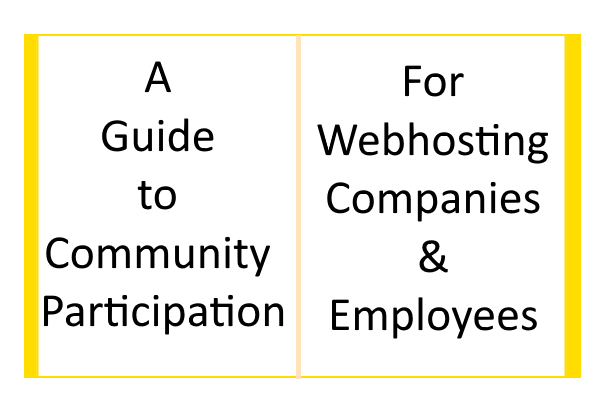Community participation is a huge part of running a business, but there are good and bad ways to engage in the various communities that physically and virtually exist. Any time someone represents or works for a company that has a financial interest in the the community, they are naturally put under more scrutiny. This is especially so when they are representing the company they work for in the community.
One of the biggest concerns in communities where people discuss web hosting issues and recommendations is that many of the participants may be connected to the companies being discussed or their competitors.
I've personally seen a lot of bad behavior and many people and companies get banned from communities for violating community rules and breaking basic ethical standards. The most recent egregious case was a company actively astroturfing various communities. In light of this discovery, I thought it might be prudent to reach out and start a discussion with multiple members of the web hosting community both as company representatives and moderators of communities about what behavior is acceptable and what isn't.
First and foremost I want to say most communities have official rules posted somewhere, those supersede any other rules in that particular community.
Contents
- 1 Tips and Advice from Experts
- 1.1 Jon Brown, Moderator of Advanced WP Facebook Group
- 1.2 Steven Gliebe, ChurchThemes.com and Former Web Hosting Reviewer
- 1.3 Corey Hammond, VP of Marketing at A2 Hosting
- 1.4 Daniel Kanchev, Enterprise Solutions Architect at SiteGround
- 1.5 Brian Krogsgard, Editor at PostStatus
- 1.6 Chris Lema, VP Products at LiquidWeb
- 1.7 Matt Mullenweg, Co-founder of WordPress
- 2 Final Thoughts
Tips and Advice from Experts
Jon Brown, Moderator of Advanced WP Facebook Group
We often get company representatives in the FB groups. That's generally welcome and most do a good job of representing themselves. The good ones see a complaint post and jump in to say "hey, I'm from __ could you PM me your support ticket number and I'll make sure it's addressed?". The better ones then come back and follow up afterward as well because we love to see that worked out in public. The best even participate in posts outside those mentioning their brand. It becomes a problem though when company representatives or their surrogates and superfans are just in the group to superficially promote their brand and don't disclose their affiliation. They are the ones that answer questions about "What's a good host or plugin?" and give a one word answer. That behavior comes across as unwelcome noise and when we see it as mods we'll often remove those users from the group. In the Advanced WordPress group we've always had a pretty strict "no promotion" rule for that reason. If someone wants to promote their services, products or latest post, they should do it outside the group doing it in the group can get them quickly kicked out.
Steven Gliebe, ChurchThemes.com and Former Web Hosting Reviewer
I think an employee should identify themselves as such whenever speaking in the context of hosting. Transparency is marketing. I remember a conversation in which a person posted a positive opinion about hosting companies and affiliate marketing. I suspected they must be with a host and sure enough they were. In retrospect, their comment was actually reasonable, but the fact that they didn't disclose their position left me with a bad taste. If they had, then I think their company actually would've gained a point with me.
It would be good for hosting folks who are coming to a community for the purpose of marketing to make it a goal to become a part of the community, lurk a bit, understand the rules, the culture, the topics. Then contribute something, and if ever appropriate, do something that gives their company exposure while adding something to the community.
Corey Hammond, VP of Marketing at A2 Hosting
Do's
- Put yourself in the customer’s shoes - You don’t know what level they’re at, or what they’ve tried (unless they articulate it well) so walk before you run. Walking can mean asking clarifying questions to help further understand the core issue. Its hard when someone comes with a broad blanket problem like ‘my website is down’ or something like that.
- Empathy - This one is related to the above, but I think spelling the word out is warranted. Imagine if its your website broken or down, how would you feel? People need to show other’s empathy in online communities.
- Don’t be afraid to apologize - Things break, no ones perfect especially when it comes to websites, domains and web hosting. Apologize. It’s not the end of the world to show some humility, especially if your the cause of it. For A2, if a customer has an issue with my service, I want them to know that I didn’t mean to cause it, or, I don’t mean for them to be in a bad spot but I’m here to help. I do feel hosting companies are the backstops for issues with people’s websites, even though that isn’t technically what we support entirely. It's ok to apologize for their website being down, then find out why and help them fix it.
- Watch your words - Its 2017, almost 2018 and your words matter. Online communities can have some volatility. If you’ve taken someone’s website down, they *might* be upset. Take a breathe, formulate a draft, and then reply. I was a #1 offender of this at one point. I wanted to protect my brand, protect my reputation, and sometimes the right words weren’t used. Being defensive or aggressive doesn’t help.
- Provide value - Go deep, answer things fully, be transparent.
- Be You - Personality can help these issues if the person on the other end understands you’re a person and you’re in a certain position just like they are. This can help build rapport.
Don’t Do/Red Flags/Bad Behaviors
- Don’t post too much information - This is in the case of if its one of my direct customers with an issue. There are security concerns, and whether the issue is on us or the customer, the conversation needs pulled off a public forum.
- Don’t get upset or defensive - I mentioned this one with a positive spin, but the minute you get super defensive or upset, you’ve lost. The customer won’t respect you. The high road needs to be taken or nothing will get accomplished. At the end of the day, you can just repeat yourself if someone is being unreasonable. “Again, I’m sorry {insert customer name}. I’ve apologized a few times, and offered to resolve the issue, but unless we take this off Facebook and into a secure place, it will be hard to help you"
- Don’t bash competitors, customers, or anyone - Be respectful. I don’t feel we win by putting our competitors down. We have some good competitors, there is no need to go full dirty by putting others down. We can find enough positive things about ourselves to focus on.
Daniel Kanchev, Enterprise Solutions Architect at SiteGround
- Don’t leave the booth unattended, even in slow periods.
- Stay positive and smile even if you think no one is looking – you don’t want abrupt changes in your behaviour/facial expression because that might send a bad signal to other people nearby.
- Make a human connection with the person on the other side, do not push them.
- No sms-ing (Facebook; Viber) and looking at the laptop, except for very brief moments when it’s really slow.
- Never sit or stand behind your booth. Nobody wants to see direct sellers sitting behind messy displays of their products, chatting with each other or looking at their phones/laptops, waiting for the attendees to step up and see if they can get their attention to ask them about their product or opportunity. You should be in front, chatting, connecting, and working with the participants.
- Don’t talk across the table. Go in front.
- Don’t interrupt your colleague while talking to a customer. You may jump in if you think you can contribute with very specific knowhow that you think your colleague lacks.
- Don’t keep people waiting. 2 people shouldn’t talk to one client if more people are waiting at the booth.
- Be Gender/Diversity tolerant and never ever discriminate on gender, race, colour, etc. If you ever encounter conversations where you do not feel comfortable, the best course of action is to not express an opinion and try to move away from the topic.
Brian Krogsgard, Editor at PostStatus
The best thing a hosting company can do is engage with a community truthfully. Don’t bring corporate spin and lofty affiliate promises. Bring your most genuine brand advocates and espouse what you believe in as a company and why it fits in with the community. I’ve seen hosts with historically bad reputations completely flip the tone of the community just by being genuine and making sure people know that the company is made up of human beings, and that their incentives are in line with the open source project the community cares so much about.
Chris Lema, VP Products at LiquidWeb
DO:
- Always be helpful
- Let people know what your company is up to
- Let people know when you're having a promotion
- Let people know when you launch something new
- Share what others are saying about your service
DO NOT:
- Don't offer discounts for customers of another host who is experiencing downtime
- Don't turn your channel / social media tools into non-stop corp promotions
- Don't hesitate to highlight what you're really good at (compared to others)
- Don't talk negatively about good competitors
- Do not forget that you won't always work for the same company
My friend, Jason Cohen (WP Engine founder and CTO) says about employees, "Everyone has a last day." What he means is that no employee will likely work for their company forever. I think of this often when it comes to employees and how they participate in communities. If you jump into a community and turn yourself into a proxy for the company, almost a carnival barker, it will be challenging later, when you end up working for someone else. So this guides my general thinking about how to participate in communities. My first rule, always be helpful, doesn't change when you join a company that is active in the community. The other reality is that your products aren't for everyone. And your competitors' products aren't for everyone either. So find your segment. Take care of them. Serve them. And in doing so, you can focus and message to them without ever being mean, hurtful or rude about your competition. In fact, there are many times when I recommend a competitor's products because the customer is in a different segment and needs something we don't offer. In that way, you can remain a helpful part of the community even while your t-shirt, hoodie or hat has the name of your employer on it.
Matt Mullenweg, Co-founder of WordPress
Be kind, helpful, respectful, and polite.
Matt also had some WordPress hosting specific tips
- Try not to cruft up your WordPress experience, typically the more a host strays from core the less likely I am to want to recommend them. Endless upsells are also a bummer.
- If you're sponsoring people to work on core, make sure they're working on the highest impact areas. It's not enough to just be in the contributor list for a release, did they lead or have a big part in a headline feature? If not, consider reprioritizing their work or finding someone whose skills are better matched to the needs of the project. (Design, usability, and Javascript are our big holes right now.)
- Please don't block xmlrpc.php, and scan the filesystem for vulnerabilities or hacks regularly.
Final Thoughts
There are a lot of other resources and rules you can look at for guidance. There is the Citizen Code of Conduct, it's a solid template for communities that need rules but it also has behavior guidelines for members of the community. Another source for some behavior guidance is the WebHostingTalk rules which govern the largest web hosting forum. They take perhaps the strongest anti-promotional stance, which if you are unsure about how to enter a community, it's hard to go wrong starting at the most conservative point. If you aren't sure about something, most moderators/community leaders/admins appreciate being contacted beforehand to check whether something is permissible in the community. The break rules and ask for forgiveness later culture doesn't go well with web hosting communities that are often bombarded with spam. You may only get one chance if you end up banned from a community.
The final thought comes from anon-e-mouse, a community leader at WebHostingTalk, "But it all comes down to common sense. Treat others as you would expect to be treated (both online and off line). Accept that there will always be complaints as with any business."
If you're involved with a web hosting company and want to get hosting company specific updates and opportunities from Review Signal please sign up for our Web Hosting Company Mailing List.
Kevin Ohashi
Latest posts by Kevin Ohashi (see all)
- Analyzing Digital Ocean’s First Major Move with Cloudways - February 28, 2023
- Removing old companies - June 28, 2021
- WordPress & WooCommerce Hosting Performance Benchmarks 2021 - May 27, 2021

 WordPress & WooCommerce Hosting Performance Benchmarks 2021
WordPress & WooCommerce Hosting Performance Benchmarks 2021 WooCommerce Hosting Performance Benchmarks 2020
WooCommerce Hosting Performance Benchmarks 2020 WordPress Hosting Performance Benchmarks (2020)
WordPress Hosting Performance Benchmarks (2020) The Case for Regulatory Capture at ICANN
The Case for Regulatory Capture at ICANN WordPress Hosting – Does Price Give Better Performance?
WordPress Hosting – Does Price Give Better Performance? Hostinger Review – 0 Stars for Lack of Ethics
Hostinger Review – 0 Stars for Lack of Ethics The Sinking of Site5 – Tracking EIG Brands Post Acquisition
The Sinking of Site5 – Tracking EIG Brands Post Acquisition Dirty, Slimy, Shady Secrets of the Web Hosting Review (Under)World – Episode 1
Dirty, Slimy, Shady Secrets of the Web Hosting Review (Under)World – Episode 1 Free Web Hosting Offers for Startups
Free Web Hosting Offers for Startups